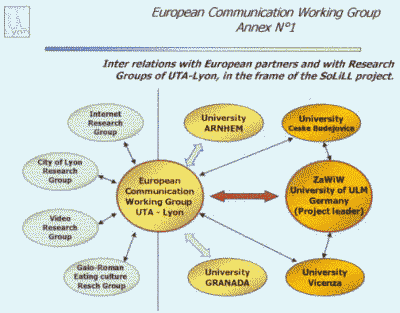 |
[ZAWiW] [gemeinsamlernen] [LiLL] | ||
| home | ||
|
|
Renovation of a City | |
|
|
||
|
|
||
 |
||
Renovation of a City
Stand:Below is a summary of research results from the seniors' group in Lyon.
The full version is available in french on their homepage. >>Link
Université Tous Ages
Lyon - France
Renovation of an ancient area of the city of Lyon:
"La Montée de la Grande Côte".
The basic concept of the SoLiLL Project is to organise autonomous learning
groups of elder people in several locations in Europe, communicating and
developing together on subjects related to : "Eating culture - Bread"
and "Housing and Public Places".
Internet, the new communication technology, is a fundamental "tool" in
this two year project.
1.- Organisation and methods of work of the UTA Group, in Lyon :
Eight senior students compose the Group responsible for the Project. All are
members of UTA, the organisation of Lyon 2 - University dedicated to the
activities of elder students.
The number of students directly involved is small, but the Group enjoys the
active support extended by several of the Research Groups already existing in
UTA, specialised in Internet, History of Lyon, Video, and Galo-Roman Eating
Culture.

The methods of work are those in use in many groups of research :
· personal investigation, contacts and home work;
· group meetings every one or two weeks, to exchange information, reach
consensus, decide and plan actions, receive training on specific matters,
communicate with the SoLiLL partners via Internet, revise the contents of the
pages produced by the students, etc.
The students have expressed their interest and motivation concerning personal
research , self managed actions, good level of cultural investigation, transfer
of information and skills by the associated partners (Research Groups of UTA,
and SoLiLL partners), etc.
2.- Some information about the project :
In the frame of the SoLiLL Project, the subject of research selected by the Group of senior students of UTA - Lyon deals with the recent renovation of an ancient area of the city, classified by UNESCO as "Legacy of Humanity". It is a narrow and steep sloping street named: La Montée de la Grande Côte.

A bit of history : The city of Lugdunum (ancient name of Lyon) was founded in 43 BC, at the confluence of the rivers Rhône and Saone, by the roman emperor Claudius, who was born in this place. The trade and traffic grew up intensively between the south and the north of the ancient Europe, and Lugdunum was one major transfer place for goods and travellers. The point of departure of the "road to the North" was located in la Montée de la Grande Côte.
|
|
|
|
With the collapse of the Roman Empire Lugdunum lost its prosperity for many centuries, nevertheless the hill named "la Croix Rousse", where la Montée de la Grande Côte is located, was occupied gradually by farmers, religious communities and monasteries. The "road to the North" persisted as a communication link and there is evidence that by the middle of the 18th Century, 40 % of the houses existing on the hill (220 out of 550), where built on both sides of this road. After a new period of prosperity of more of one century, based on the expansion of weaving activities due to the invention of the mechanical-loom by Mr. Jacquard, also born in Lyon, the industrial and trade activities declined severely.
The renovation of la Montée de la Grande Côte : in the decade of 1950, the area of la Montée de la Grande Côte was an insalubrious and bad frequented area, occupied by low income inhabitants and immigrants. The population has decreased from 63 000 in 1931, to 23 000 nowadays.
The demolition of several unhealthy buildings in the 70's triggered criticism
and a large number of associations of neighbours became very active. As a
consequence of intensive lobbying and political pressure, the program of
demolition was stopped and a Program of Renovation in several phases was
imagined. It is the implementation of this Program, and its practical
consequences, that the Group of students of UTA-Lyon have investigated.
The students are currently working out the pages of the report describing the
history of the street and its renovation.
The information delivered by the other partner Groups involved in the SoLiLL
Project, for similar renovation or reconstruction programs in their respective
places, will be integrated in the publication of UTA-Lyon, which will be
delivered to the Project Co-ordinator, ZAWIW in Ulm, by May 2002.



